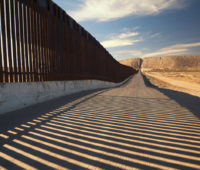Racial loyalties and predjudices have historically weighed heavily in American immigration debates. So accustomed have Americans become to racialized perspectives that both advocates and analysts tend to expect that the arguments of partisans for particular policies, whether for or against restrictionist or expansionist goals, are motivated by racial bias even when other factors may be […]
While debates over illegal workers, border controls, employer sanctions, access to services, amnesty, temporary workers, and the like have persisted at least since the formation of the Select Commission on Immigration and Refugee Policy in 1979, the positions taken by advocates and the policies proposed by politicians have recently become more contentious and extreme.
In the coming months, reconciling divergent views in the House and Senate on these issues in legislation will be difficult, if not impossible. The Bush administration’s Border Security Initiative would deploy new military technologies, 370 miles of fence, 6,000 National Guard, and 15,000 new Border Patrol officers. While many Senators insist on amnesty-like “pathways to citizenship” for most of the estimated 11-12 million undocumented immigrants, the majority in the House would block access to permanent residency and impose felony charges for illegal entry. Up for renewed scrutiny are restrictions on immigrants’ access to health, education, and social services, and high-tech identification cards for all Americans. And more.
In unprecedented public response, hundreds of thousands of undocumented and legal immigrants have joined protest marches in cities across the country, culminating in the May 1st “Day without Immigrants.” Private militias are patrolling the border to make up for federal, state, and local governments’ “chaotic neglect” of border enforcement. And in national newspaper ads the Mexican government is claiming “shared responsibility” for U.S. policies and is publicly protesting to President Bush about his plans.
What sense can be made of the forces that are driving these conflicting stances and tumultuous activities? In “Border Battles: U.S. Immigration Debates” you can find original insights from social scientists on the key underlying issues.
Immigration and Insecurity: Post-9/11 Fear in the United States
by Rey Koslowski and Items AdminThe attacks of September 11, 2001, transformed the landscape of global security, none more than borders and immigration. The topography of citizenship, belonging, and suspicion instantly changed for Arab and Muslim communities in the United States. They drew the sharp attention of U.S. law enforcement and intelligence services, and that continues. But the public’s focus […]
The Bits of a New Immigration Reality: A Bad Fit with Current Policy
by Saskia Sassen and Items AdminWhen Mexico’s (former) President Fox met with undocumented Mexican immigrants during his visit to the US this past May, his actions amounted to the making of a new informal jurisdiction. His actions did not fit into existing legal forms that give sovereign states specific types of extraterritorial authority. Nonetheless, his actions were not seen as […]
How Grandma Got Legal
by Mae Ngai and Items Admin“Made in America—by immigrants” and “We too have a dream” read signs at the May 1 marches across the country. By invoking an American ideal, today’s newcomers are staking their claim as the latest generation of nation-builders. But their critics object to this appeal to history; they resent comparisons to previous generations of immigrants, who […]
Labor and the New Immigrant Rights Movement: Lessons from California
by Ruth Milkman and Items AdminThe groundswell of immigrant rights demonstrations that emerged across the nation in reaction to the passage of the Sensenbrenner bill (H.R. 4437) by the U.S. House of Representatives in late 2005 took many by surprise. Yet this wave of protest did not come out of nowhere. The groundwork was laid by over a decade of […]
The Impact of Immigration on American Society: Looking Backward to the Future
by Charles Hirschman and Items AdminIntroduction Even as most Americans celebrate their heritage and identity as a “nation of immigrants,” there is deep ambivalence about future immigration. There is a strong base of support for continued immigration as a necessary ingredient for economic growth and as an essential element of a cosmopolitan society among many Americans. Almost 60 million people— […]
Great Migration Debates: Keywords in Historical Perspective
by Donna Gabaccia and Items AdminWhen confronting recent debates, historians of migration often muse over similarities between past and present. Certainly there are so many continuities in the positive and negative qualities attributed to foreigners a century ago and today that one wonders whether any new data could ever possibly resolve such long-standing disagreements. Here, however, I want to focus […]
Migrant “Illegality” and the Metaphysics of Antiterrorism: “Immigrants’ Rights” in the Aftermath of the Homeland Security State
by Nicholas De Genova and Items AdminThe mass protest mobilizations in defense of the rights of immigrants, and especially the undocumented, took the United States by storm during the spring of 2006, with half a million marching in Chicago on March 10 (reportedly the largest single demonstration on record in the city’s history), at least a million in Los Angeles on […]
Looking Beyond the Moment: American Immigration Seen from Historically and Internationally Comparative Perspectives
by Richard Alba and Items AdminThe great void in the US discussion of immigration policy, which today seems to split the society as well as its political representatives, is the absence of a clearly articulated vision of the role of immigration in the society’s future. It combines dangerously with the deeply rooted sense of American exceptionalism, which keeps many Americans […]

